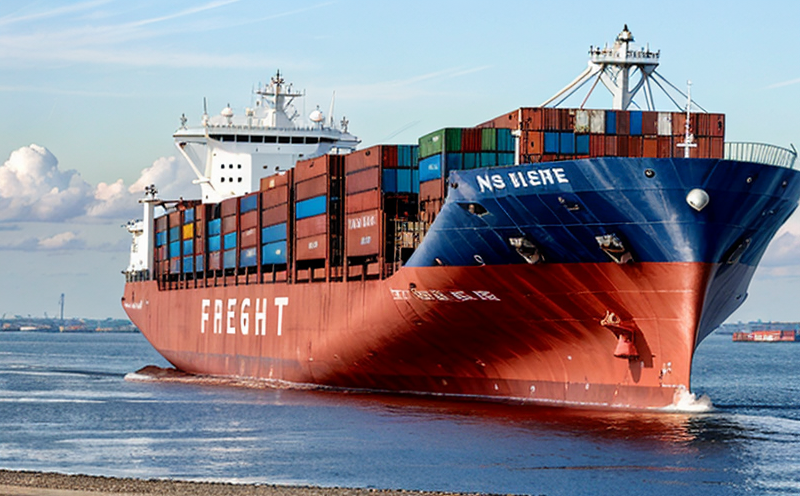Freight ship inspection
The freight ship inspection is a critical service within the transportation and logistics sector. This comprehensive examination ensures that ships are in compliance with international maritime safety standards to protect crew, cargo, and the environment. Conducted by accredited laboratories, this service covers several aspects including structural integrity checks, mechanical system assessments, and functional tests of vital equipment.
Freight ship inspections are mandatory for ensuring adherence to international regulations such as the International Convention for the Safety of Life at Sea (SOLAS) and the International Ship and Port Facility Security Code (ISPS). These inspections play a pivotal role in maintaining operational safety standards, minimizing risks associated with maritime activities, and promoting a secure environment aboard ships.
The inspection process involves meticulous evaluations using advanced testing techniques. This includes ultrasonic testing for detecting structural flaws, hydraulic tests to check the integrity of piping systems, and functional checks of navigation equipment like gyrocompasses and radar systems. The scope also encompasses verification of emergency procedures, fire safety measures, and life-saving devices.
Upon completion of the inspection, a detailed report is generated which outlines all findings and recommendations for necessary rectifications. This document serves as an essential reference for ship owners and operators to ensure ongoing compliance with maritime regulations.
The importance of freight ship inspections cannot be overstated in today’s globalized economy where efficient transportation plays a key role. By adhering strictly to these standards, we contribute towards safer seas and sustainable shipping practices that are crucial for the environment and economic stability.
Environmental and Sustainability Contributions
- Reduces fuel consumption through optimized vessel performance.
- Promotes cleaner emissions by ensuring compliance with exhaust gas limits.
- Aids in reducing accidents which could lead to oil spills or other pollution events.
- Encourages the use of renewable energy sources for onboard operations.
The freight ship inspection plays a crucial role in enhancing environmental sustainability. By identifying inefficiencies and potential hazards, this service helps reduce fuel consumption and emission levels. This not only translates into cost savings for operators but also contributes positively to global efforts aimed at combating climate change.
Avoiding accidents is another significant benefit of regular inspections. Such incidents can have dire consequences including environmental degradation from oil spills or other pollutants. By ensuring that ships are well-maintained and operate efficiently, we help minimize these risks significantly.
Competitive Advantage and Market Impact
The freight ship inspection service provides a competitive edge by offering unparalleled assurance of compliance with international maritime standards. This ensures that clients meet regulatory requirements while also enhancing their reputation among peers and customers alike. By demonstrating commitment to safety and sustainability, companies can attract more business opportunities both locally and internationally.
Moreover, staying ahead in terms of inspection technology and methodologies allows for continuous improvement in service quality. This translates into reduced downtime for vessels undergoing inspections, leading to increased productivity and efficiency within the shipping industry.
The demand for reliable freight ship inspections is expected to grow as more emphasis is placed on sustainable practices across all sectors. Companies that invest early in robust inspection services will find themselves well-positioned to meet future challenges head-on.
Use Cases and Application Examples
| Use Case | Description |
|---|---|
| New ship commissioning | Ensuring all systems work correctly before first voyage. |
| Annual vessel inspection | Maintaining compliance with SOLAS and ISPS regulations annually. |
| Premature failures or incidents | Investigating issues following an accident or significant malfunction. |
| Preparation for certification audits | Preparing documentation and evidence of compliance for external reviews. |
| Application Example | Description |
|---|---|
| Structural integrity testing | Checking hull plates, bulkheads, and other structural components using advanced techniques like ultrasonic testing. |
| Mechanical system assessment | Evaluating propulsion systems, steering gear, and auxiliary machinery for proper functioning. |
| Functional verification of safety equipment | Testing fire extinguishers, lifeboats, and other emergency devices to ensure they are operational. |





